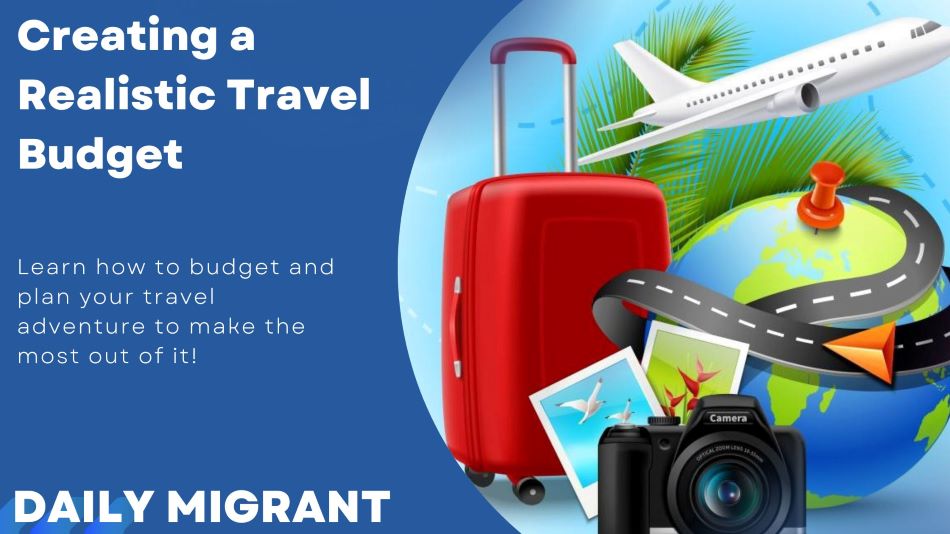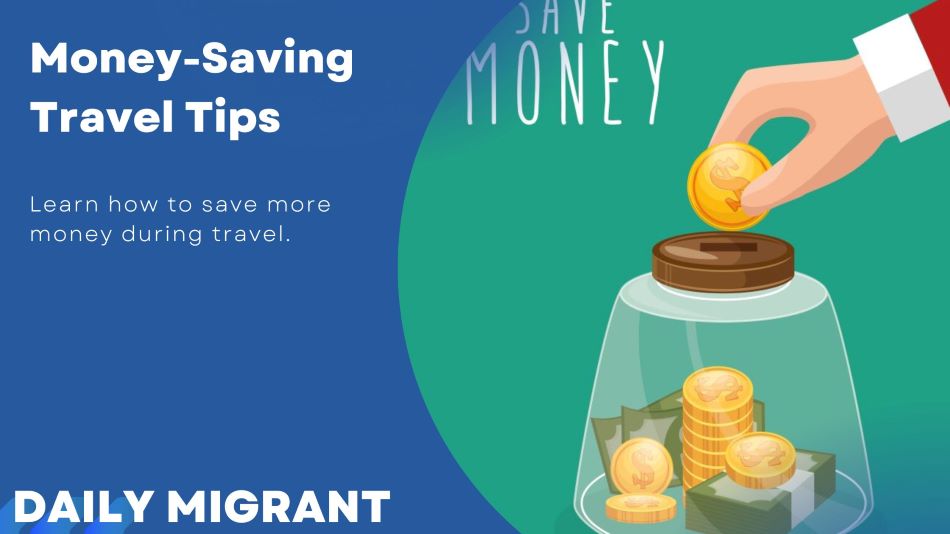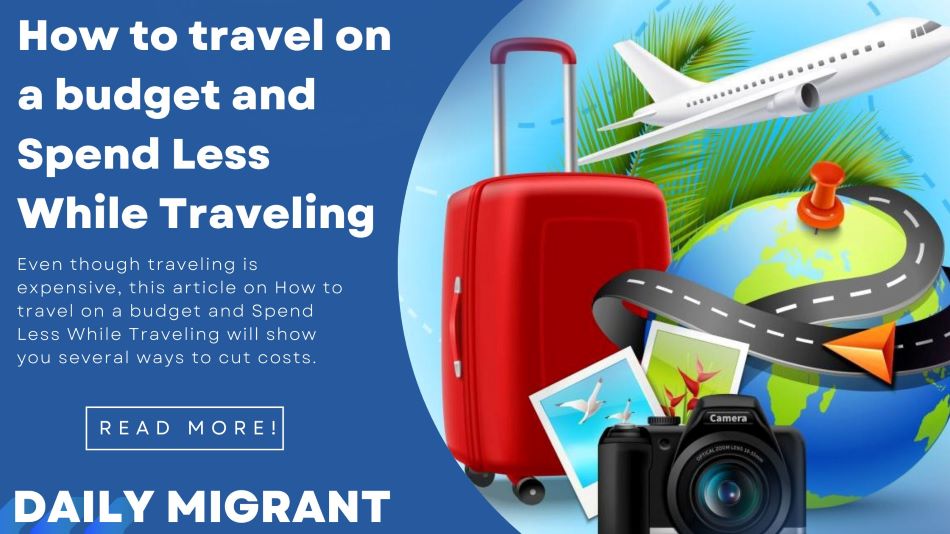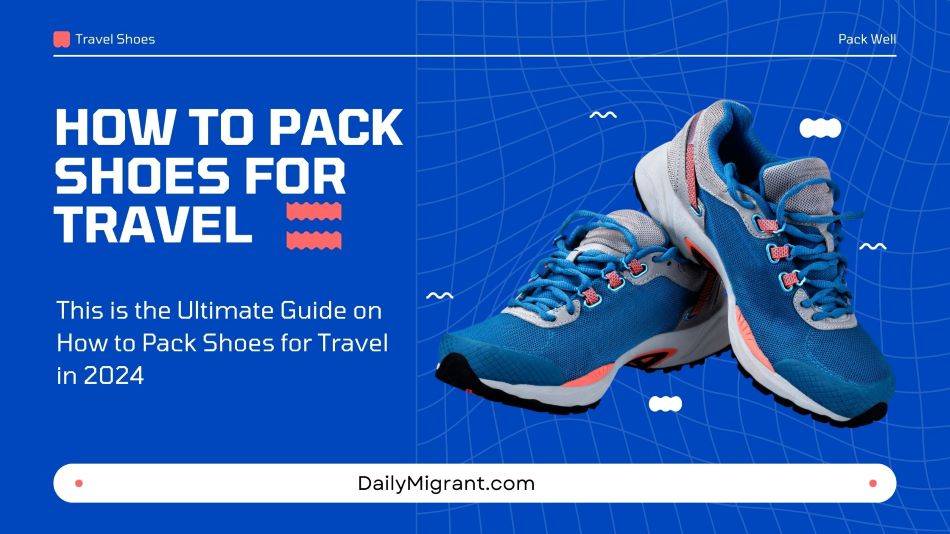Introduction
Even though traveling is expensive, this article on How to travel on a budget and Spend Less While Traveling will show you several ways to cut costs.
For many reasons, traveling on a tight budget is fascinating and satisfying.
It enables you to go to new places, experience various cultures, and make lifelong experiences without breaking your wallet.
Budget travel can also be more enjoyable and satisfying than spending a lot of money on luxurious hotels and activities.
Being on a tight budget forces you to be more inventive and imaginative, and you’re more likely to push yourself to try new things and venture outside of your comfort zone.
A 2022 survey by Booking.com found that 58% of travelers prefer budget-friendly accommodation options.
Also, another survey by Skyscanner in 2021 found that 62% of travelers are planning to spend less on travel in 2023 than they did in 2022.
Furthermore, the global low-cost airlines market reached a value of US$ 172.54 Billion in 2021 according to GlobeNewsWire.
Looking forward, the publisher expects the market to reach a value of US$ 302.85 Billion by 2027, exhibiting a CAGR of 9.83% during 2021-2027.
All these statistics indicate that low-cost travel is growing in popularity as more and more individuals look for ways to save costs when they travel.
This extensive guide on Daily Migrant will delve into the art of budget travel and provide you with helpful advice to enable you to cut costs while seeing the world.
Everything from setting up a budget to finding cheap ways to get about, stay somewhere, eat, and do anything you want will be covered in this article.
We will also provide you with advice on how to handle unplanned expenses and how to save money on souvenirs.
Whether you’ve traveled before or this is your first trip, this article on Daily Migrant will show you how to travel on a budget while having a great travel experience!
How to Plan Your Budget Travel Adventure

Setting Travel Goals and Priorities
To make the most of your vacation when traveling on a tight budget, it is essential to establish clear goals and priorities.
This step-by-step guide will help you plan properly and also teach you how to travel on a budget.
Selecting your Destination
The very first thing to do when you are planning to travel is to pick your ideal location.
As of 2019, there were 1.5 billion foreign tourist arrivals globally, and the World Tourism Organization (UNWTO) predicts that this number will rise over time.
With so many choices, it’s crucial to take into account locations that reflect your interests and values.
Your destination should represent your interests, whether you’re drawn to ancient towns rich in culture, exotic tropical beaches, or uncharted landscapes just waiting to be explored.
How long do you plan to travel?
As you plan to travel, you need to set your travel goals to decide how long your vacation will last.
The longer the travels, the wiser it is to be more frugal in budgeting, but longer travels also present the chance for greater experiences and interactions with the local culture.
The UNWTO estimates that the average length of international trips worldwide is 9 days.
Nevertheless, this can vary greatly based on your choices and location.
Think about how long you can comfortably travel on a given budget, and adjust your objectives as necessary.
Experiences vs. Expenses
Deciding whether to put experiences or expenses first is one of the most crucial decisions you will need to make when planning a budget travel journey.
Numerous statistics demonstrate that individuals prefer experiences to material stuff.
According to a Cornell University study, experiences typically lead to more happiness than material possessions because they foster enduring memories.
Therefore, it is wiser to give experiences a higher priority than acquiring trinkets when putting together your vacation objectives.
- Seek out thrilling adventures:
With a 21% annual growth rate, adventure tourism is a fast-growing industry, according to the Adventure Travel Trade Association (ATTA).
This shows that adventurous experiences are becoming more and more popular.
- Engaging in cultural interactions during travel:
During your travels, it is wise to immerse yourself in cultural interactions by embracing new experiences, connecting with locals, and learning about their traditions.
Be open-minded, curious, and respectful, and you’ll be rewarded with a deeper understanding of the world and yourself.
- Indulge in the local cuisine:
A great method to immerse yourself in a place’s culture is to explore the local food available there.
The majority of tourists are actively looking for distinctive culinary experiences, which has led to the enormous growth of the food tourism industry.
Therefore, before choosing a location for your next journey, consider your interest in food.
Make sure your stay is the right length for your budget and permits an in-depth exploration of the local culinary scene.
In the end, give these experiences the highest priority because they often transform into your most cherished trip memories.
Creating a Realistic Travel Budget

Fixed Costs for traveling
Imagine that you want to travel from Miami to the sunny New York City.
You should already know that flights and accommodation are included in your fixed costs.
Again, you can Utilize fare comparison websites like Kayak, Skyscanner, or Google Flights to find the best and cheapest deals.
With the aid of these tools, you may compare airline tickets and choose the most affordable one.
Additionally, booking in advance will often give you the best prices.
Platforms like Airbnb and Booking.com provide a variety of lodging options to fit your budget.
To get discounts or free nights, take into account loyalty programs from brands like Marriott Bonvoy or Hilton Honors.
Variable Costs for travelling
Now, let’s discuss the day-to-day expenses you will need during your travel.
Let’s assume that you want to explore San Francisco on foot by yourself.
You’ll need to set aside money for activities, transportation, and meals.
It’s a good idea to budget a little bit extra for meals than you estimate needing incase you stumble into a great seafood restaurant near Fisherman’s Wharf or opt to savor some famous clam chowder.
In terms of traveling around the city, you can use apps like Uber or Lyft, but you should also think about using the public transportation system because it’s often more affordable.
If you’re traveling to a rural area, you may need to rent cars.
In terms of activities, businesses like Viator or GetYourGuide provide a variety of tours and experiences at different prices.
Emergency Fund for traveling
Let’s now talk about your emergency fund which could be your safety net during your travels.
If you accidentally twist your ankle while hiking in Colorado’s magnificent outdoors for example, what do you think will happen?
The answer is simple – Medical costs might go up rapidly!
Companies like Allianz Travel Insurance can help in this situation.
Travel insurance can save your life by paying for unforeseen medical expenses and even trip cancellations brought on by unforeseen circumstances.
It gives you peace of mind while traveling and ensures that you can handle any unexpected situations without blowing your budget or worrying about money while traveling.
Researching Cost-Effective Destinations for Your Travels

Off-Peak vs. Peak Season
Do you have plans to visit the breathtaking Grand Canyon in the USA?
It is worthy of note that, you’ll pay more for flights and lodging if you choose to travel during the busiest time of year, which is the summer.
However, consider going in the off-peak season, perhaps in the late fall or early spring.
This choice can help you significantly reduce your travel and lodging costs.
Additionally, there are fewer people around to disturb your peaceful and pleasurable experience as you explore the spectacular landscapes.
Websites like Expedia and CheapTickets provide possibilities to compare prices and get the best deals when booking flights.
Budget-Friendly Countries and Regions
In budget-friendly countries and regions, imagine that you have a dream of traveling abroad.
Your budget can benefit greatly from research into areas or nations with cheaper costs of living or favorable currency exchange rates.
For instance, if you’ve always wanted to travel through Europe, you might want to consider going to Hungary or Portugal.
These nations provide fantastic cultural experiences and breathtaking natural scenery at a small fraction of the price of more expensive European cities.
Also, you can utilize a multi-currency card like Revolut or TransferWise, which can help you avoid currency translation fees, to manage your finances while traveling.
Experience Hidden Gems During Vacation
What if you want to go hankering for a distinctive yet inexpensive vacation?
Why not go off to undiscovered jewels instead of taking the well-traveled tourist route?
Consider the charming community of Asheville, North Carolina, which is tucked away amid the Appalachian Mountains for instance.
Although it’s frequently disregarded in favor of bigger towns, it provides breathtaking natural beauty, a thriving arts scene, and affordable lodging.
By visiting such unknown locations, you can save money while also having authentic experiences away from the crowds and noise.
These less-traveled locations frequently feature listings on websites like Airbnb and Vrbo.
Money-Saving Travel Tips

Finding Affordable Accommodation
- Hostels and Guesthouses:
You should consider staying in a hostel or guesthouse to reduce your accommodation costs if you are planning a trip to the ever-lively locations of the world like New Orleans or Tokyo.
These choices provide inexpensive lodging with shared facilities, making them perfect for lone travelers or those hoping to connect with other adventurers.
Additionally, they frequently plan entertaining activities and trips, so you’ll have lots of opportunities to socialize and meet new friends.
You can also uncover appropriate options that won’t break the bank with the assistance of companies like Hostelworld.
- Airbnb and Vacation Rentals:
We advise that you explore the world of holiday rentals by using websites like Airbnb rather than making several hotel reservations assuming you want to take family on a beautiful vacation.
This can be particularly cost-effective for parties or longer stays because you’ll have extra space, a kitchen to prepare your meals, and frequently lower rates per person.
It’s like having a second home away from home, and you can take advantage of the local culture while saving money on daily meals out.
- Camping and Couchsurfing:
Camping in national parks or even just outside popular destinations can be a fantastic way to save on accommodation costs.
If you’re feeling even more adventurous, you can try Couchsurfing, a platform where locals offer travelers a free place to stay.
It’s not just about saving money; it’s also about forming genuine connections with the people who call your destination home.
And it often leads to unforgettable experiences and insights that you will never find in any guidebook.
Budget-Friendly Transportation
Public Transportation
Imagine yourself in the bustling center of New York City, where every penny is valuable.
Here, taking the subway not only saves money but is frequently the most effective method to go about the city’s districts.
Comparing it to taxis or ride-sharing services, it is more affordable, faster, and more dependable.
Compared to a cab price for the same distance, a single subway journey can cost as little as $2.75.
Ride-Sharing and Carpooling
Now, Let’s use traveling to Los Angeles, where the traffic may be a big hassle as an instance.
Consider using ride-sharing services like Uber or Lyft rather than going it alone.
You can save money and lessen your environmental impact by sharing the cost of transportation with other travelers or by taking advantage of carpooling opportunities.
This is a win-win situation!
Carpooling can save you up to 75% on transportation expenditures when compared to driving alone, according to data, and it also lowers carbon emissions.
Walking and Biking
Strolling or Walking around the cobblestone streets of Charleston, South Carolina’s, colonial districts is one of the best ways to experience its charm.
It’s not only a cost-effective option, but also a wonderful way to fully experience the local way of life.
As an alternative, you can rent a bicycle, which is not only cost-effective but also offers a sustainable mode of transportation.
When you travel around on two wheels, you can find hidden gems like charming cafes or beautiful parks that you might otherwise miss.
Smart Dining Choices
Eating Local Street Food
During travel, people mostly like lavishing at expensive restaurants where the enticing aroma of classy food permeates the atmosphere.
But, why not explore the neighborhood’s street food culture instead of lavishing at expensive restaurants?
Purchase some Corn dogs or Hamburgers from a food vendor and you’ll not only taste the city’s real delicacies, but you’ll also save a ton of money.
According to studies, eating on the street can be up to 50% less expensive than dining at a restaurant.
Additionally, you get to experience the deep culinary tradition of the community.
Cooking Your Meals
Now, assuming you traveled to Maui, Hawaii, with its stunning natural beauty and you get an accommodation that has a kitchenette, you should take advantage of it!
To find fresh, reasonably priced ingredients, visit local markets like the Lahaina Farmers’ Market or the Maui Swap Meet.
Not only does cooking your food save you money, but it also offers a wonderful opportunity to discover regional produce and time-honored cooking techniques.
As you prepare some fresh poke bowls or grill some local fish, picture yourself relaxing on your lanai and soaking in the island breeze!
Lol!
Also, it is generally healthier to cook your food than to buy cooked food anywhere.
Budget-Friendly Restaurants
Finally, let’s arrive in Austin, Texas, a city renowned for its growing food culture.
When going out to dine in Austin—or any other city, for that matter—select neighborhood cafes over tourist traps with exorbitant rates.
Ask for advice from locals or other tourists; they frequently know where the secret treasures are.
Try Franklin Barbecue, for instance, where you can have delicious brisket without spending too much money.
Eating at these types of restaurants ensures that you experience genuine regional cuisines while also saving money in the process.
So, by considering these dining choices and real-life scenarios, you can savor the culinary delights of various U.S. destinations while keeping your wallet happy.
Whether you want to relish the street food in New Orleans, cook in Maui, or discover budget-friendly gems in Austin, remember that flavorful experiences are within reach without emptying your pockets!
Entertainment and Activities During Travel

Free and Low-Cost Attractions
On specific days of the week or at specific times, several museums provide free admission. For instance, admission to the Smithsonian museums in Washington, D.C., is always free.
Also, Public parks offer wonderful opportunities to experience nature and discover the surrounding area.
There are many free activities offered in New York City’s Central Park, including concerts, walking tours, and wildlife programs.
Many cities provide either free or heavily discounted entrance to cultural venues including theaters, art galleries, and historical monuments.
For example, the 2.5-mile Boston Freedom Trail is a walking route that passes 16 historically significant locations, all of which are open to the public for free.
In these ways, you can delve into the rich history of the nation without straining your budget.
Statistics reveal that visiting free attractions can save travelers over $150 per day!
Discount Cards and Passes
Discounted admission is available through CityPASS for several well-known sites in significant American cities.
For instance, the New York City CityPASS includes entrance to the Statue of Liberty, the American Museum of Natural History, the Empire State Building, and two additional attractions of your choice.
Another option for obtaining discounted entrance to numerous sites in significant American cities is the Go City Pass.
Go City Pass lets you pick the number of attractions you wish to visit as well as how long your pass is valid, unlike CityPASS, which has a predetermined fee.
Cultural Experiences
Learning about the regional cuisine and culture can also be done by taking cooking classes.
One culinary school that provides a variety of lessons is the New Orleans Culinary School, which also offers a Cajun and Creole cooking course.
A fantastic method to become fully immersed in the culture is to take a language course.
As a case study, the Spanish Immersion Institute in Puerto Rico provides a range of Spanish language programs for students of all skill levels.
Another wonderful opportunity to give back to the community and discover its culture is by volunteering.
For instance, all 50 states in the United States have volunteer opportunities available through Habitat for Humanity International.
Travel Insurance

Whether you’re planning a domestic road trip or an international excursion, it is necessary to purchase travel insurance.
Anywhere, at any moment, unexpected things can happen, and travel insurance can help you guard against the financial repercussions of these occurrences.
Here are some of the key benefits of travel insurance:
- Medical coverage:
Travel insurance can pay for medical costs, such as emergency care, hospitalization, and prescription drugs, incurred while traveling.
Travelers with pre-existing medical issues or those going to places with poor access to healthcare should pay particular attention to this.
- Trip cancellation:
If you must cancel your trip due to a covered reason, such as illness, injury, or job loss, travel insurance can compensate you for non-refundable travel charges.
- Trip interruption:
If your trip is cut short due to an eligible reason, such as inclement weather, a natural disaster, or political upheaval, travel insurance may be able to compensate you for unused travel expenses.
- Lost luggage:
Travel insurance can cover the expense of replacing necessary items as well as the value of lost or stolen luggage.
Finding Affordable Travel Insurance
When you compare prices from various firms, travel insurance can be surprisingly inexpensive.
Here are some pointers for locating inexpensive travel insurance:
- Compare prices:
Before making a purchase, compare prices from other travel insurance providers. Online comparison tools can help to simplify this procedure.
- Think about your needs:
There are differences between various types of travel insurance.
Make sure to pick a policy that offers the protection you require based on your travel schedule and financial constraints.
- Use coupons and discounts:
Student, elder, and military discounts are frequently provided by travel insurance providers.
If you purchase your travel insurance in advance, you could also be able to receive a discount.
Staying on Budget During Your Trip
Tracking Your Expenses
Budgeting Apps and Tools
You can track your expenditure with a variety of smartphone applications and budgeting programs that are available.
A few popular choices include YNAB, Personal Capital, and Mint. For an in-depth overview of your finances, these applications can automatically sync with your bank accounts and credit cards.
Keeping a Daily Expense Journal
You can keep a daily cost record if you choose a more manual method.
You can accomplish this by simply recording your spending in a notebook or spreadsheet.
Be careful to keep account of every penny you spend, including on travel, meals, lodging, and activities.
Avoiding Unnecessary Expenses
Tourist Traps and Scams
When you’re on a journey, being aware of tourist traps and scams might help you avoid losing money and frustration.
Do your research first; reading travel blogs and forums can give you important information on frequent scams and tourist traps in the area you have picked.
Additionally, be wary of seemingly alluring freebies like samples or tours because they frequently include additional fees.
It’s generally a good idea to avoid pushy or aggressive salespeople.
Trust your gut; if something doesn’t feel right, it’s better to err on the side of caution.
Avoid Impulse Shopping during Travels
Your travel budget can be quickly depleted by impulsive purchases.
Establish a souvenir budget before your trip, defining how much you’re willing to spend, to prevent falling into this trap.
This set spending cap will aid you in avoiding impulsive purchases.
When you see something you like, avoid the impulse to buy it right away. Instead, do some window shopping and decide later if you still want it.
Ask yourself if you really need the thing or if it’s just an impulse urge before making any purchases.
Last but not least, think about getting souvenirs at the end of your vacation.
This gives you time to think about what you want and avoids making impulsive purchases.
Conclusion
In conclusion, the beauty of low-cost travel goes much beyond just the ability to save a few dollars.
It’s about building relationships, opening doors to amazing experiences, and creating cherished memories that last a lifetime.
By carefully following the advice provided in this extensive blog post on How to travel on a budget by Daily Migrant, you may travel on a budget while also experiencing life-enriching experiences that you might not have otherwise had.
As you venture forth, remember that budget travel isn’t about sacrificing quality or adventure; it’s about smart choices and mindful exploration.
It’s a chance to see the world, to grow personally, and to immerse yourself in the diverse cultures that make our planet so extraordinary.
If you enjoyed this article on How to travel on a budget and Spend Less While Traveling, let’s know your thoughts in the comment section!
References
- 2022 Booking.com Travel Predictions: https://www.booking.com/c/trends/travelpredictions2022.html
- 2021 Skyscanner Consumer Confidence Report: https://www.skyscanner.net/news
- Global Low-Cost Airlines Market Report (2022 to 2027) – Industry Trends, Share, Size, Growth, Opportunity, and Forecasts: https://www.globenewswire.com/en/news-release/2022/08/22/2502166/28124/en/Global-Low-Cost-Airlines-Market-Report-2022-to-2027-Industry-Trends-Share-Size-Growth-Opportunity-and-Forecasts.html
- Facing up to the Crisis (By UNWTO) https://www.unwto.org/reports/from-crisis-to-transformation/from-crisis-to-transformation.html
- The World Tourism Barometer: https://www.e-unwto.org/loi/wtobarometereng
- Doing makes you happier than owning – even before buying: https://news.cornell.edu/stories/2014/09/doing-makes-you-happier-owning-even-buying
- What is food tourism?: https://www.worldfoodtravel.org/what-is-food-tourism
- Franklin Barbecue: https://franklinbbq.com/






